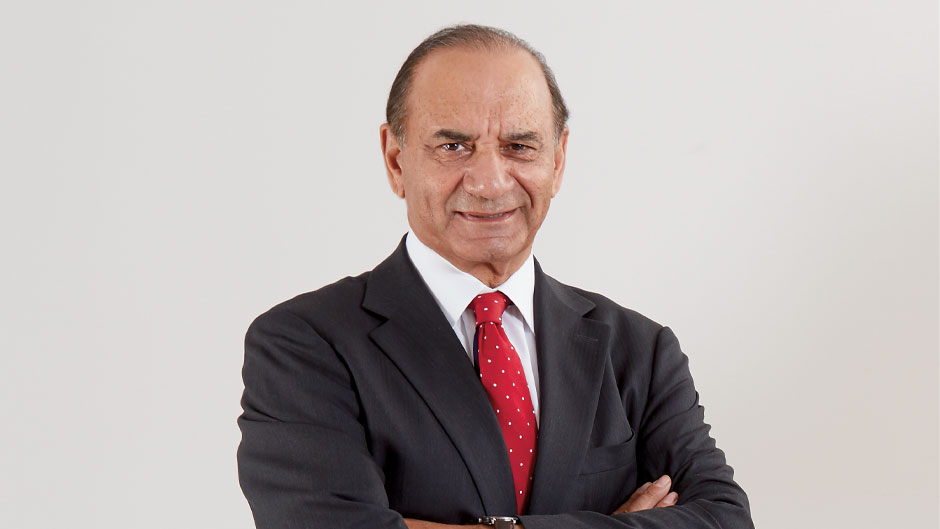Farooq Kathwari, who became president of Ethan Allen Interiors in 1985 and CEO and chairman in 1988, shared his insights on leadership and life in a webinar Thursday with the University of Miami Patti and Allan Herbert Business School. Dean John Quelch moderated the conversation.
In the talk, Kathwari highlighted the importance of several guiding principles that have served as the foundation for the extraordinary success of the home furnishings manufacturer and retailer—90 consecutive profitable years of business.
The basis of those principles—a commitment to hard work, resourcefulness, resiliency, integrity, and empathy—were forged during his early years and upbringing in Kashmir, a regional territory in the far north of India that has been the source of conflict for decades between India, Pakistan, and China.
“First and foremost, you have to be an innovator,” said Kathwari, adding that his experience as captain of his cricket team served as a major influence in his life. “The captain plays with the team, strategizes with the team, is part of the team—so building teams, being a captain was part of the principles that I grew up with.”
The company’s principles are grounded on his own understanding of a leader’s true purpose.
“The main job of a leader is to help their people become better, whether it’s an enterprise, a state, or a country—yet unfortunately that is not understood,” he said. “Many leaders don’t understand that their main job is not to get the most and give the least, but to help their people become better.”
Kathwari explained that he immigrated to the U.S. in his early 20s, went to school at night, and took a first job in New York as a bookkeeper—an occupation he knew little about when he took the job. His Kashmiri grandfather provided him with a dozen wicker baskets of artisan crafts to sell as a way of surviving the early going in a new country.
He made inroads with several department stores and then contacted Ethan Allen about marketing certain goods.
Hearing he was from Kashmir, the founder of the company asked if he could help resolve a frustrating delay of a fabric from the Indian territory. Though he knew no one involved at first, Kathwari soon resolved the issue. A year later, the founder contacted him about delivery problems with rugs from Romania and India. Again, he tackled the challenge and soon had a solution.
Impressed by his resourcefulness, the founding chairman invited him first to partner with and then to join the company.
“To do what?” Kathwari remembers asking. “The only reason I’d come would be to take your job,” he told the chairman. It took a few years, but the company eventually hired him to head operations.
“That took tremendous courage for a traditional American company with 30 manufacturing plants all over the country to hand over the leadership reins to a young person named Farooq,” he said.
In the early 1990s, the firm’s stores were operated by families all around the country, each run differently and utilizing distinct marketing approaches.
Leaning on his experience as a cricket captain—a team should operate as one team—Kathwari moved to standardize store names, pricing, logistics, and the business model. With the transition, 97 percent of the stores opted to remain within the system, he said.
“This created a unified Ethan Allen and gave us the opportunity to reinvent our stores,” he noted.
Instead of following the route of many firms at the time that began to manufacture overseas because of cheaper labor costs, Kathwari chose to concentrate manufacturing in Vermont and North Carolina, close plants elsewhere in the country, and to look south of the border.
The company purchased and outfitted a plant in Guanajuato, in central Mexico. That plant today has been expanded to 600,000 square feet, and employs 1,300 people, Kathwari pointed out. Another plant opened in Honduras employs 600 local workers.
Both plants have been designated by the respective governments of those two countries as “best places to work,” based on working conditions, the provision of medical care, transportation support, and other worker benefits, according to Kathwari.
Quelch, who referred to Kathwari as a “great immigrant who has become a great American,” asked about a recent full-page advertisement in The Wall Street Journal and The New York Times, titled “Our Proud American Brand.”
Kathwari reported that the messaging highlighted that for 90 years the company has projected great value and service and focused on treating its employees well and developing and maintaining manufacturing in the United States. And today the company finds it necessary to expand.
“The indirect message was that our leaders should think about south of the border, the only thing they seem to think about is these folks are coming to the border—well, help them,” Kathwari proclaimed. “The folks working for us in Mexico and Honduras have no interest in coming to the border of the U.S. They’re treated well, they’ve got good jobs. Why would they come?”
He pointed out that the company has not suffered from supply chain issues during the pandemic. Products from Mexico are delivered and moved by train through Texas and on to North Carolina. Goods from the plant in Honduras are shipped to Miami.
Kathwari has shared his leadership skills with a host of nonprofit organizations, including as chairman emeritus of Refugees International, on the board of advisors of the International Rescue Committee, and as part of the advisory board of the Center for Strategic and International Studies. He founded a study group that continues to seek solutions for the conflicted area of his homeland in Kashmir.
In 2018, he was recognized by the U.S. Citizenship and Immigration Services with the Ellis Island Medal of Honor as an Outstanding American by Choice. He documents his life trajectory in his memoir, “Trailblazer: From the Mountains of Kashmir to the Summit of Global Business and Beyond.”
